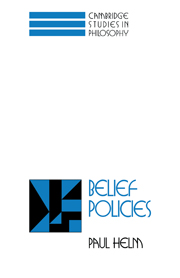Book contents
1 - Belief, knowledge, and norm
Published online by Cambridge University Press: 22 August 2009
Summary
It is a philosophical commonplace that belief is conceptually tied to truth. In believing that p A takes p to be true. The taking of p to be true is distinct from whether p is desired or feared or admired or whatever.
BELIEF AND ITS STRENGTHS
Taking p to be true can have varying degrees of strength. Sometimes philosophers and others have attempted to offer a measure of that strength in terms of the odds that the putative believer would be willing to take on p's truth. But it does not follow that because a person is willing to take odds on a proposition's being true that the proposition is strongly believed. There may be propositions which a person is prepared to take odds on to which only minimal assent is given. At a more theoretical level, degrees of belief in p can be separated from expected utilities if p is true, so that betting can play a more convincing role as an index of the strength of a belief (Ramsey, 1990; Mellor, 1971). L. J. Cohen defends the view that a belief is a disposition to feel, and hence denies that it is like a disposition to bet (Cohen, 1992, pp. 5–6).
In ‘Consciousness and Degrees of Belief’ (Mellor, 1980) Mellor argues that taking odds is what he calls a case of assent, having a belief about a belief. Gambling may measure or express such assent, and beliefs about beliefs are no doubt fallible, though often reliable. I might be mistaken about the strength of my belief, which might be better evidenced in action.
- Type
- Chapter
- Information
- Belief Policies , pp. 11 - 31Publisher: Cambridge University PressPrint publication year: 1994



